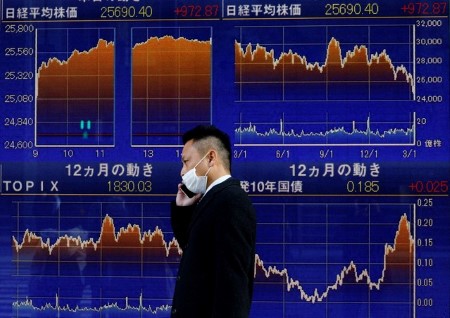




Quarterly Economic Growth Release: More BSP cuts to come
 DOWNLOAD
DOWNLOAD

Monthly Economic Update: Fed catches up
 DOWNLOAD
DOWNLOAD

Inflation Update: Steady and mellow
 DOWNLOAD
DOWNLOAD


China stocks fall on fresh COVID curbs; coal shares slump

SHANGHAI, Aug 30 (Reuters) – China stocks ended lower on Tuesday, as more cities tightened COVID-19 restrictions in response to rising cases, fuelling fears of a further economic slowdown.
Investors were also concerned about tightening global monetary policies, which could drain liquidity and limit room for China continue easing its policy.
The CSI 300 Index fell 0.3% at close, while the Shanghai Composite Index was down 0.4%.
The Hang Seng Index dropped 0.4%, while the Hang Seng China Enterprises Index lost 0.5%.
Other Asian stock markets attempted to steady as investors turned their focus to this week’s US labour market report to gauge if interest rate hikes that have been priced in around the world are justified.
Several big Chinese cities escalated COVID-19 restrictions on Tuesday, with Shenzhen closing more businesses and Dalian locking down millions.
“Despite a decline in headline COVID cases, the actual COVID situation in China might be worsening,” Nomura analysts said in a note. “Markets could once again be hit in the next couple of weeks, likely triggering another round of cuts (in GDP forecasts) by economists on the street.”
Energy companies slumped more than 4%, with coal miners shedding 5.4% to lead the decline.
Energy stocks have gained more than 12% so far in the month, amid a supply shortage due to China’s most severe heatwave in decades.
State media reported over the weekend that the power crunch driven by drought in the southwestern province of Sichuan had started to ease as temperatures fell.
Real estate stocks rose 1.9% after Caixin reported China would issue CNY 200 billion (USD 29 billion) in special loans to help developers finish stalled housing projects.
China will step up measures to boost demand and stabilise employment and prices in the second half to optimise economic outcomes, the country’s finance ministry said on Tuesday.
Tech giants listed in Hong Kong edged down 0.5%.
China and the United States made a breakthrough in an audit deal, but legal experts and China watchers warn the two sides could still clash over how the accord is interpreted and implemented.
(Reporting by Shanghai Newsroom; Editing by Subhranshu Sahu and Rashmi Aich)
This article originally appeared on reuters.com





 By Reuters
By Reuters